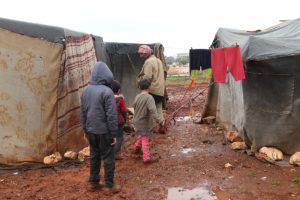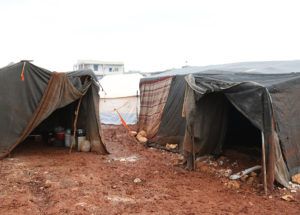 Stories
Stories
February 1, 2021 • 4 min read
We are providing emergency relief to hundreds of displaced families affected by heavy rains in North West Syria
The families in 13 camps were affected by the recent flooding in Idleb in northern Syria.
More than 120,000 displaced people in a total of 304 camps have been affected by the floods and the harsh winter weather in the last two weeks. GOAL is delivering ready-to-eat food kits, household items, and multi-purpose cash transfers to families who were forced to abandon their shelters.
One of those being supported by GOAL is Abdulhadi, a 40-year old man who lives in Al-Obead camp in Idleb with his wife and nine children. “Rain lasted ten days” he said. When the rain flooded his family’s tent he had to act quickly to get his children to safety.

Abdulhadi and his children.
110 families eke out a living in Al-Obead, a tented informal camp for internally displaced persons set on agricultural land in Idleb’s countryside. Many of the camp’s residents are from Abu al-Duhur, a small town south of Aleppo city, and had to flee their homes after the line of fire approached their villages in January 2018.
Abdulaziz, a 42-year-old father of eight, notes that it was very difficult for his children to escape their tent as the family’s belongings started to sink in the mud. As Abdulaziz helped his children, several of whom suffer from mental disability, get out of the tent, the family’s neighbours tried very hard to clear out the rainwater and save the heating device the family will need to survive the winter.
In a joint statement released on Friday, GOAL and a number of other NGOs working in the region warned that the UN Security Council vote of July 2020 to further limit cross-border humanitarian access points into Syria is impeding the response.
The statement said: “Over the last week, sub-zero temperatures, heavy rain and wind has forced more than 20,000 displaced people to abandon their homes and shelters after heavy flooding, and has led to the death of at least one child. For thousands of families, it will take a very long time to recover from this storm.”
It added: “Women, men and children are suffering from lack of access to aid, including food, water and medical supplies including oxygen, and funding is falling short of meeting the basic needs of millions of Syrians across the country.
With only 9 hospitals operationalized for COVID-19, 212 ICU beds and 162 ventilators in North West Syria for a population of four million, the overwhelmed health sector is unable to cope with the rise in cases, leading families to desperate measures to survive.”
Six months ago, the UN Security Council voted to close a critical crossing point for humanitarian aid between Turkey and Syria at Bab al-Salam. The crossing had facilitated better coordination and faster delivery of desperately needed humanitarian assistance including food, shelter, and medical supplies for hundreds of thousands of displaced people in North West Syria, the majority of whom are women and children.
Covid-19 cases in North West Syria now stand at 20,717, after the number of cases reportedly quadrupled between November and December 2020. These numbers are thought to be a vast underestimate due to extremely limited case detection and testing capacity across the country.

Abdulaziz families tent
The joint NGO statement said: “With a healthcare infrastructure decimated by 10 years of conflict, the pandemic is threatening to turn an already dire humanitarian situation into a catastrophe, as families in Northern Syria face stark choices to survive. Many cannot afford to feed their families, let alone buy a mask to protect themselves and others. Lack of oxygen and insufficient access to adequate water and sanitation are just some of the desperate circumstances that health workers have had to contend with while trying to save the lives of people suffering from Covid-19 over recent months.
“Just one channel now remains through which the UN is able to deliver life-saving supplies including those needed to address the life-threatening effects of Covid-19 and winter to populations in the North West, at a time when more and more families are being forced to make unacceptable tradeoffs to survive.
“Aid going through this last remaining crossing, Bab al-Hawa, has never been more important but is under immense pressure. Violence and insecurity have previously forced the crossing to close, and ongoing conflict risks delaying the delivery of aid to vulnerable populations. There are fears adverse weather conditions or insecurity may at any time cut off the only remaining road to reach hundreds of thousands of displaced people previously supported through the now-closed Bab al-Salam crossing.”
